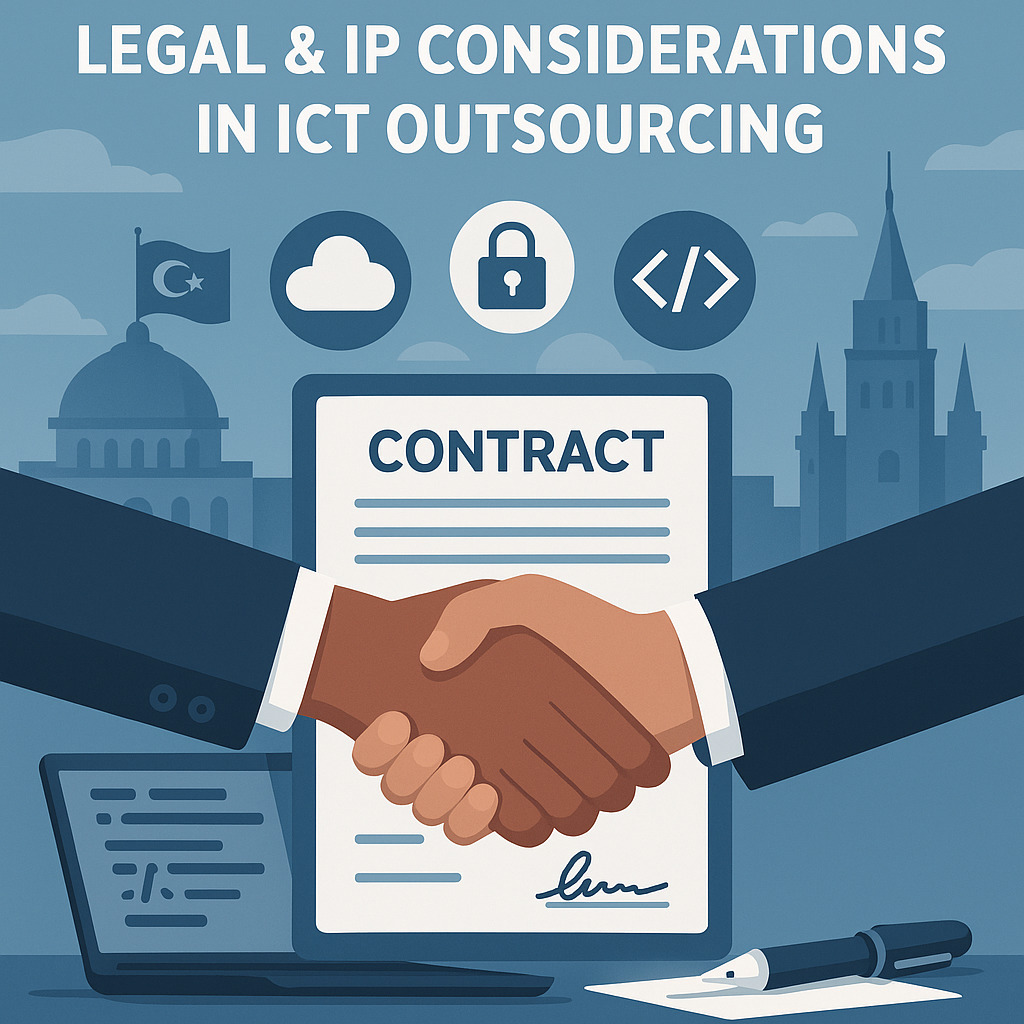Cross-Border Compliance in Outsourcing: Navigating Global Regulations
- 1 min read
Ensure your outsourcing strategy meets global standards—learn how cross-border compliance protects your business and fuels growth with Euro IT Sourcing.

Introduction
Expanding outsourcing operations across borders offers significant cost, talent and innovation advantages. However, cross-border compliance is no longer optional, it’s a strategic imperative. At Euro IT Sourcing, we guide B2B clients through the compliance maze so they can scale without regulatory setbacks.
In today’s global marketplace, operations may span Eastern Europe, Asia, Latin America or the Middle East. Each jurisdiction brings unique data protection, tax, labour, and export control regimes. Ignoring them risks fines, reputational damage or stalled projects. We’ll explore how to build a robust framework, quantify outcomes, and highlight risks—and mitigations—so you’re fully equipped for cross-border outsourcing success.
Why Cross-Border Compliance Matters in Outsourcing
Data Protection & Privacy
When you outsource services or engage remote teams across borders, you often transfer and process personal or corporate data internationally. For instance, the General Data Protection Regulation (GDPR) imposes strict obligations for data transfers out of the EU.
Read more at Clutch Events
Non-compliance can result in heavy fines and limit market access.

Taxation & Employment Law
Employing or contracting across countries triggers local tax, social security and employment law issues. Already recognised as a core element of cross-border compliance: “meeting all applicable employment, tax, labour and data protection laws when operating across international boundaries.”
Read more at Asanify
Export Controls & Intellectual Property
If outsourcing involves technology, IP or regulated services, you may face export or import controls. For example, a global practice guide on technology outsourcing highlights the need for compliance with tech-import/export rules, especially in jurisdictions such as China.
Read more at Chambers Practice Guides
Trade, Customs & Partner Vetting
Outbound or inbound component sourcing, service delivery or data flows may implicate customs, trade sanctions or partner (vendor) compliance.
Read more at GigaBPO
Building a Compliance Framework for Outsourcing
1. Jurisdictional Mapping and Gap Analysis
- Identify all jurisdictions involved (client country, service-provider country, subcontractor country).
- Map relevant regimes: e.g. GDPR/EU, labour law in the provider’s country, export controls, tax residency.
- Conduct a gap analysis: Which laws apply, where are current processes lacking, what documentation is missing?
Read more at eBizFiling
2. Policy, Contracting & Process Design
- Embed compliance into contracts: Data processing agreements (DPAs), service level agreements (SLAs), export control clauses, vendor due diligence.
- Develop internal policies: Data transfer policy, vendor management policy, training & awareness.
- Standardise processes: onboarding/off-boarding remote staff, access to data, audit trails, vendor audits.
3. Technology & Monitoring Tools
- Use technology to automate monitoring of compliance triggers: e.g. data transfers to non-adequate jurisdictions, contract renewal alerts, vendor performance dashboards.
- Leverage centralised compliance dashboards or tools for multi-jurisdiction tracking.
Read more at SmartAsset
4. Training, Audit & Continuous Improvement
- Train internal and external teams: remote workers, vendor teams, data handlers.
- Audit annually (or more frequently) compliance status, vendor adherence, change-management events (law changes).
- Update frameworks as laws evolve: “regulation change” is a recurring challenge.
Read more at Papaya Global
Metrics & Outcomes
Here are example KPIs you should track to measure the value of a compliance-oriented outsourcing programme:
- Number of jurisdictions with compliance gaps identified → resolved gap ratio (e.g., 100% of mapped jurisdictions).
- Time to contract execution (reduced by standardised policy + templates).
- Number of vendor audits completed per annum.
- Percentage of data transfers routed via approved mechanisms (e.g., standard contractual clauses (SCCs), binding corporate rules (BCRs)).
- Regulatory incidents or fines: aim for zero material breaches.
- Market-entry speed improvement (enter new outsourcing country faster due to established framework).
Companies using structured cross-border compliance support achieve faster market entry and reduced legal risk.
Read more at GigaBPO
Risks → Mitigations
- Risk → Mitigation: Operating in a jurisdiction with weak regulatory oversight → Mitigate by using a reputable provider subject to audited compliance frameworks and integrating contract-driven oversight.
- Risk → Mitigation: Outdated contracts missing recent law changes → Mitigate with contract review cadence, centralised repository and alerting for legislative updates.
- Risk → Mitigation: Data transfer to country without adequacy decision → Mitigate by implementing SCCs/BCRs or restricting processing to compliant jurisdictions.
- Risk → Mitigation: Vendor/sub-vendor compliance failure → Mitigate with multi-tier vendor due-diligence, audit rights and termination clauses.
- Risk → Mitigation: Unclear tax/employment risk on remote workforce → Mitigate with employment classification review, local legal counsel involvement and payroll/reporting oversight.
Key Takeaways
- Cross-border compliance is integral to outsourcing success, not a side issue.
- A robust framework spans data protection, tax/employment, export/trade and vendor governance.
- Standardised processes, strong contracting and technology support drive scalability and risk reduction.
- Quantifiable metrics help measure and communicate compliance value and operational speed.
- Ongoing vigilance, audits and updates are non-negotiable due to evolving regulations.
Author: Matt Borekci
Contact Us: Euro IT Sourcing

Legal & IP Considerations in ICT Outsourcing
Learn the key legal and intellectual property considerations in ICT outsourcing. Discover how to protect your assets and ensure compliance when working with nearshore teams like those in Turkey.

Outsourcing in the Age of Digital Sovereignty: A New Risk Factor
Discover how digital sovereignty shifts outsourcing risk, and how Euro IT Sourcing helps businesses navigate this landscape.